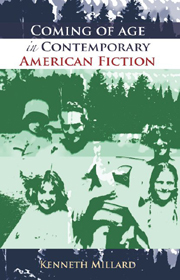Book contents
- Frontmatter
- Contents
- Acknowledgements
- Introduction: Contemporary Coming of Age – Subject to Change
- 1 In the Name of the Father
- 2 I Change Therefore I Am: Growing up in the Sixties
- 3 Citation and Resuscitation
- 4 Language Acquisition: Life Sentences
- 5 Lexicon of Love
- 6 Memoirs and Memorials
- Conclusion
- Bibliography
- Index
5 - Lexicon of Love
Published online by Cambridge University Press: 12 September 2012
- Frontmatter
- Contents
- Acknowledgements
- Introduction: Contemporary Coming of Age – Subject to Change
- 1 In the Name of the Father
- 2 I Change Therefore I Am: Growing up in the Sixties
- 3 Citation and Resuscitation
- 4 Language Acquisition: Life Sentences
- 5 Lexicon of Love
- 6 Memoirs and Memorials
- Conclusion
- Bibliography
- Index
Summary
Since its inception in Germany in the eighteenth century, the bildungsroman has traditionally been understood as a male genre. From Huckleberry Finn (1885) to The Catcher in the Rye (1951), and Dale Peck's What We Lost (2003), coming of age has been associated with the story of how boys become men. As a result, Barbara White believes that critics ‘have tended to ignore female experience and universalise the experience of boys’ (White 1985: 15), and Elizabeth Abel argues that ‘while male protagonists struggle to find a hospitable context in which to realise their expectations, female protagonists must frequently struggle to voice any aspirations whatsoever’ (Abel et al. 1983: 7). These two critical works, Growing up Female: Adolescent Girlhood in American Fiction, and The Voyage In: Fictions of Female Development, have been complemented by other studies, such as E. K. Labovitz's The Myth of the Heroine: The Female Bildungsroman in the Twentieth Century (1986) and Susan Fraiman's Unbecoming Women: British Women Writers and the Novel of Development (1993), which provide scholarly and theoretical support for the idea that there is a tradition of women working in the coming-of-age genre. The question is whether traditional conceptions of the genre are fundamentally altered by women writers working in it (to the point where an experimental novel such as Cisneros' The House on Mango Street is not really a bildungsroman), or whether the genre, as it is conventionally understood, simply does not permit women to express themselves properly.
- Type
- Chapter
- Information
- Coming of Age in Contemporary American Fiction , pp. 130 - 153Publisher: Edinburgh University PressPrint publication year: 2007



